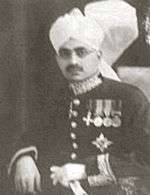Unionist Party (Punjab)
The Unionist Party was a political party based in the Punjab Province during the period of British rule in India. The Unionist Party mainly represented the interests of the landed gentry and landlords of Punjab, which included Muslims, Hindus and Sikhs. The Unionists dominated the political scene in Punjab from World War I to the independence of South Asia, its division into India and Pakistan (and the partition of the province) in 1947.
Organisation
The Unionist Party, a secular party, was formed to represent the interests of Punjab's large feudal classes and gentry. Sir Sikandar Hyat Khan, Sir Fazli Husain, Chaudhry Sir Shahab-ud-Din, and Sir Chhotu Ram were the co-founders of the party. Although a majority of Unionists were Muslims, a large number of Hindus and Sikhs also supported and participated in the Unionist Party.
In contrast with the Indian National Congress and many other parties of the time, the Unionist Party did not have a mass-based approach. Also in contrast with Congress, the Unionists supported the British Raj, and contested elections for the Punjab Legislative Council and the central Legislative Council at a time when Congress and the Muslim League were boycotting them. As a result, the Unionist Party dominated the provincial legislature for a number of years, allowing an elected provincial government to function when other provinces were governed by direct rule.
Link with the Muslim League

The Muslim elements of the Unionists shared many common points with the Muslim League and followed a rather similar policy and agenda for national interests and issues;[1] but the Unionists were virtually an independent political party in the 1920s and 1930s, when the Muslim League was unpopular and divided into feuding factions. The links improved after Muhammad Ali Jinnah became the League's president in the mid-1930s and by October 1937, and then he was able to convince Sir Sikandar Hayat Khan to come to terms with him via the famous Sikandar-Jinnah Pact.[2] However, the rule of Unionist leader Sir Sikandar remained undisputed in the Punjab and he remained the Punjab's Premier (Chief Minister) from 1937 to 1942, in alliance with the Indian National Congress and the Shiromani Akali Dal despite Jinnah's opposition to both parties. Sir Sikandar thus remained the most popular and influential politician in Punjab during his lifetime, preventing both Jinnah and Sir Muhammad Iqbal from gaining the support of a majority of Punjabi Muslims.
Decline
As the demand for Pakistan grew more intense, political loyalties in the Punjab were reshaped on religious lines. The Direct Action Day campaign brought the downfall of Sir Khizar's ministry, which depended on Congress and Akali support; inter-community relations were effectively destroyed as communal violence across India claimed the lives of tens of thousands of people. With the partition of the region of sub-continent in August 1947 into the two independent dominions of India and Pakistan, Punjab was itself partitioned between the two new countries, with the Muslim-majority West Punjab forming part of Pakistan, and the Hindu/Sikh-majority East Punjab forming part of independent India. The Unionist Party's diverse pan-provincial organisation was destroyed, with Muslim Unionists integrating themselves into the Muslim League; the party ceased to exist in independent Pakistan.
Legacy
In Sindh Province, a Sind United Party modelled on the lines of the Punjab Unionists and representing similar interests. It became the largest party in the province at the 1937 provincial election.
In 2013, guar farmers in Rajasthan formed the National Unionist Zamindara Party (or Zamindara Party) to represent their interests. While there is no connection to the historic Punjab Unionists, the new party honours the legacy of Unionist leaders like Sir Chhotu Ram.[3] The party was successful in winning 2 seats in the 2013 state election.
See also
References
- ↑ Prof. Stanley Wolpert, "Jinnah of Pakistan", Karachi:Oxford UP, 1999 reprint, pp. 150-151
- ↑ Wolpert, p.151
- ↑ Guar farmers plan own party in Rajasthan
